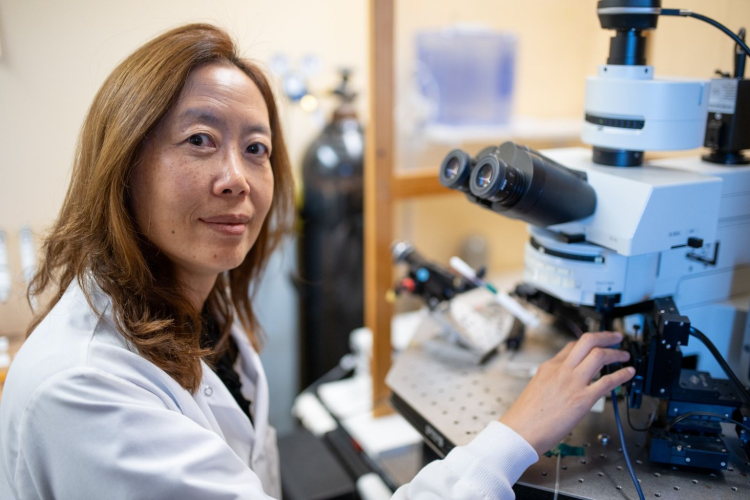A Memorial University faculty member's research could help uncover a simple and accessible way to prevent Alzheimer's before the disease's first symptoms even appear.
Dr. Qi Yuan, a professor in the Department of Biomedical Sciences, Faculty of Medicine, has spent more than a decade uncovering how memories are made, saved and lost in the aging brain.
Now, with her fourth research grant from the Canadian Institutes of Health Research (CIHR), she is continuing her work in a new direction.
Stopping and reversing Alzheimer's
Dr. Yuan and her co-investigator, Dr. Touati Benoukraf, the Faculty of Medicine's Canada Research Chair in bioinformatics for personalized medicine, have received $837,675 for a five-year project to explore how probiotics might help stop or reverse the earliest changes in the brain associated with Alzheimer's disease.
Dr. Yuan says her lab focuses on memory formation and cognitive decline, particularly as it relates to aging and neurodegenerative diseases.
"We've developed a unique rat model that mimics the earliest stages of Alzheimer's by introducing human tau protein into the locus coeruleus, one of the first regions of the brain affected by the disease," she said.
Tau is a protein found mostly in brain cells that helps keep them healthy by supporting their structure and ensuring nutrients and other important materials are transported where they're needed.

Dr. Qi Yuan's research team already has preliminary evidence showing that dietary changes can significantly alter brain function and reduce Alzheimer's symptoms. Photo: Rich Blenkinsopp
However, in people with Alzheimer's and other brain disorders, they stop working the way they should.
Over time, this contributes to memory loss and other symptoms of dementia.
"One of the earliest warning signs of Alzheimer's is a loss in the sense of smell," said Dr. Yuan. "Animals, such as rats, associate a particular smell with something either pleasant or aversive and they learn how to approach or avoid the odor. In our rat model, this type of odor learning is impaired, resembling early preclinical signs in humans."
Dr. Yuan's latest CIHR grant will allow her to build on this work, to explore whether a simple non-invasive dietary intervention can slow or prevent these early changes and examine the role of the gut microbiome in influencing brain health and vulnerability to disease.
Specifically, they will test whether probiotic supplementation can reduce neuroinflammation, improve gut microbiota diversity and preserve cognitive function.
"This project reflects years of foundational work, building our rat model, piloting probiotic studies and establishing our genomics and microbiome platforms," Dr. Yuan said. "We are now focusing on lifestyle and the diet to see the correlation between these environmental factors and disease progression in our models."
Dramatic change
Her team already has preliminary evidence showing that dietary changes can significantly alter brain function and reduce Alzheimer's symptoms in their model.
"It's very dramatic and something you can change really easily," said Dr. Yuan. "Eat more yogurt to have more beneficial probiotics which can influence your brain, help you think better and, in the long run, help you age in a healthy way."
"The majority of Alzheimer's is not genetic." Dr. Qi Yuan
The project will also consider key variables that are often overlooked in preclinical research, including sex and age differences.
Women are disproportionately affected by Alzheimer's. Dr. Yuan is actively investigating this disparity.
She says Alzheimer's has a long incubation period, typically decades, and that any intervention that can happen before the preclinical stage is "very helpful."
Promising research
Being awarded a fourth CIHR grant is not just a professional accomplishment for Dr. Yuan, it's a validation of the years of effort by her and her team.
She says the funding will ensure she can maintain momentum, support talented trainees and expand collaborations with experts in bioinformatics and microbiome science.
"Receiving CIHR support signals that our approach, targeting Alzheimer's at its earliest, most reversible stages, is recognized as promising by the broader scientific community," she said. "The majority of Alzheimer's is not genetic. It's sporadic and it's affected by your environment, how you grow up, your stress and your achievement.
"Alzheimer's is very malleable, but too often interventions come too late" she continued. "That's why we focus on the early, pre-clinical stage, so we can educate people on what to do to prevent this future disaster."













